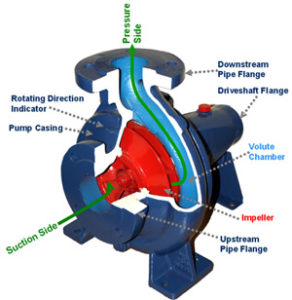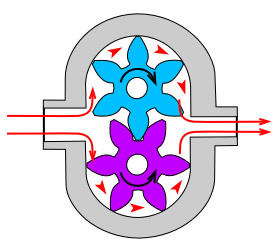Choosing the Proper Pump for Your Heat Transfer System
Your pump has a huge influence over your heat transfer system. It affects performance, efficiency and can even impact the service life of your fluid. So what do you need to know when choosing a pump for your system?
For starters, let’s look at the most common pumps used in heat transfer systems.

Figure 1: Cross-sectional view of a centrifugal pump. (photo courtesy of Wikipedia)
Figure 1: Cross-sectional view of a centrifugal pump. (photo courtesy of Wikipedia)
Centrifugal pumps (Figure 1) are very common in thermal fluid applications. These pumps basically use an impeller with rotating blades to impart velocity on the fluid and move it throughout the system.
Some centrifugal pumps are made specifically for thermal fluids and use more durable materials, enclosed impellers, higher quality seals and support temperatures as high as 850°F (454°C) to manage the most demanding applications.
Centrifugal pumps also give you the flexibility to choose between sealed or sealless designs. This article from Process Heating offers some good information on this topic.
Positive displacement pumps (Figure 2) aren’t as common but are typically used in smaller, electrically heated systems. Also known as gear pumps, these units trap fluid between interlocking gear teeth and force the fluid out to the rest of the system. They usually have mechanical seals.
Regardless of which type of pump you’re considering, check with the manufacturer to make sure it’s suitable for use with thermal fluids. Stay away from standard process pumps, too – they’re not as durable and generally don’t perform well enough for thermal fluid applications.

Figure 2: A positive displacement pump. (photo courtesy of Wikipedia)
Figure 2: A positive displacement pump. (photo courtesy of Wikipedia)
Some manufacturers specialize in thermal fluid pumps. Dean Pump Division, MP Pumps, Inc. and Teikoku/Chempump are but a few examples for centrifugal designs. Viking Pump is one possibility if you need a positive displacement pump.
Some of these manufacturers also offer custom design services and can even help determine the proper size for your pump. Size is a critical factor here – the pump has to be powerful enough to handle a fluid’s viscosity and move the fluid throughout the system. If it’s undersized, the pump won’t supply enough fluid to the system. Commonly known as “low flow”, this situation can cause severe problems including pump cavitation, poor performance, and higher than recommended film temperatures, which will break down your fluid in a hurry.
The key is horsepower – a properly sized pump should have adequate horsepower to supply the system with enough fluid to operate efficiently.
Another important thing to remember is something that’s often overlooked: make sure the pump is capable of handling the fluid’s viscosity at its ambient (start-up) temperature and not just its operating (output) temperature. If your pump can’t move the fluid at ambient, you’ll run the risk of overheating the fluid.
We’ve provided some basic guidelines here, but it’s important to work closely with engineers and pump manufacturers when making your choice. You may also want to check out Pump Scout. Their site’s a great resource for information on various pump designs, buying tips and terminology.
Have questions or comments? Please let us know.
Michael Bates, Technical Director
1-800-446-4910 ext. 111

